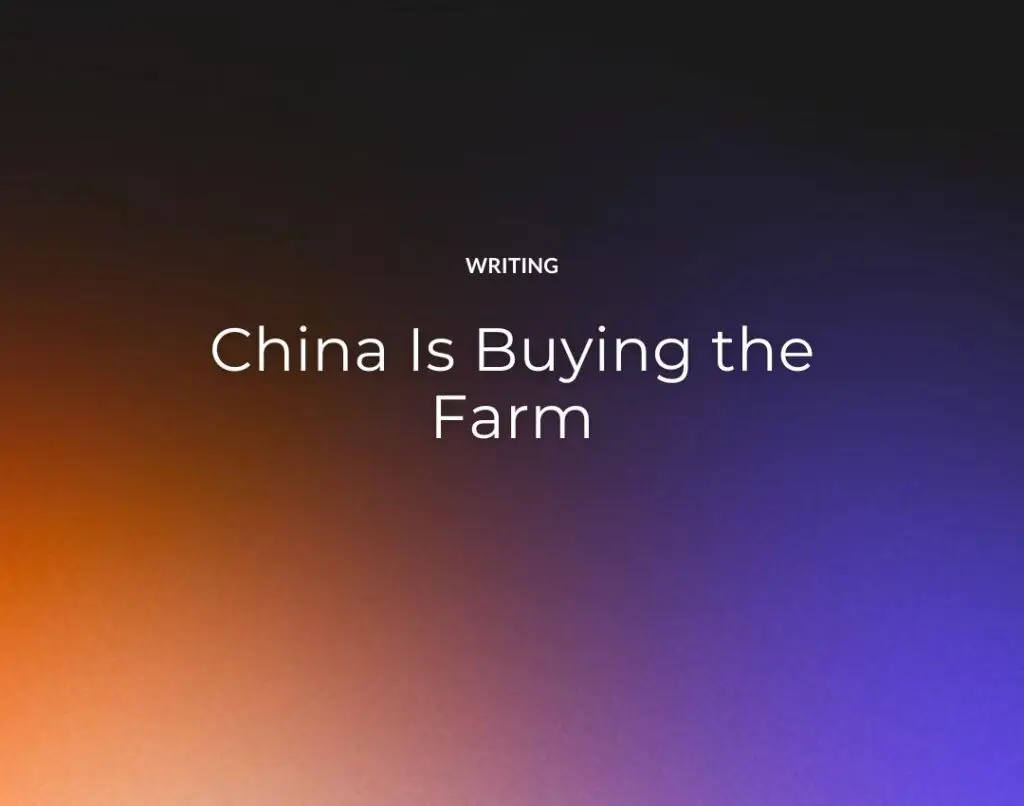State-owned companies have bought many acres near U.S. military bases. What is Beijing up to?
By Lars Erik Schönander and Geoffrey Cain
Wall Street Journal
September 8, 2022

Workers sort cuts of fresh pork in a processing plant in Zhengzhou, China, Nov. 24, 2017. PHOTO: DOMINIQUE PATTON/REUTERS
Alarms went off in Washington when the Fufeng Group, a Chinese agricultural company, bought 300 acres of land and set up a milling plant last spring in Grand Forks, N.D. The plant is a 20-minute drive from an Air Force base that, according to North Dakota Sen. John Hoeven, hosts a space mission that “will form the backbone of U.S. military communications across the globe.”
The deal shouldn’t have taken the federal government by surprise. U.S. Department of Agriculture data show that Chinese ownership of U.S. farmland leapt more than 20-fold in a decade, from $81 million in 2010 to $1.8 billion in 2020. Beijing hasn’t outlined a strategy, but large-scale state backing for these investments indicates there is one. In 2013 the government-owned Bank of China loaned $4 billion to Hong Kong-headquartered WH Group, the world’s largest pork producer, to buy Virginia’s Smithfield Foods. WH now controls much of the U.S. pork supply and revenue because of the deal.
The U.S. produces a food surplus, so shortages aren’t a problem. But no one should assume this prosperity will be permanent. The war in Ukraine has squeezed global grain supplies. Add in threats from inflation, natural disasters and supply-chain instability, and you can see why the U.S. should pay more attention to its food security.
We don’t know the full extent of Chinese investment in American farmland. Farm sales are disclosed under a little-known 1978 law called the Agriculture Foreign Investment Disclosure Act, or Afida, which requires investors in American farmland to report property purchases to the USDA.
Government transparency on these investments falls short of basic standards. Until a few months ago, USDA’s online reports went back only as far as 2004 and the data required special software to extract. Information on older purchases could be obtained only through Freedom of Information Act requests. Officials have admitted that they don’t review filings related to foreign purchases of American farmland, and the data on such transactions contain errors.
Then there’s the problem of complex corporate structures that help Chinese investors obscure ownership and evade scrutiny. One Chinese billionaire, Sun Guangxin, invested an estimated $110 million in Texas farmland. He planned to build a wind-turbine farm on a 15,000-acre Val Verde County parcel that would give him access to the Texas electricity grid. There isn’t much in Val Verde County besides Laughlin Air Force Base. In 2020 then-Rep. Will Hurd wrote an op-ed in the Houston Chronicle urging the federal government to halt the project on national-security grounds. Mr. Sun’s company, GH America, received $163,513 in Paycheck Protection Program loans during the pandemic.
The U.S. has recently imposed sanctions against Chinese tech firms such as Huawei and Megvii as threats to national security. These successes offer a few lessons.
Congress should authorize the USDA to cut through byzantine ownership structures and find the true foreign owners of farmland. The recently introduced Farmland Security Act of 2022 would require the department to release all data on foreign investments in American agriculture. The agriculture secretary should be added to the Committee on Foreign Investment in the U.S., which reviews flows of foreign money into sensitive businesses such as surveillance-camera equipment and semiconductors.
Afida is also overdue for a basic government audit that might reveal new data and improve disclosure practices. The last audit was in 1989. Major Chinese companies such as the Fufeng Group, which happen to buy up large plots of land near sensitive American military installations, should have to make their case or be shown the door.
Mr. Schönander is policy technologist at Lincoln Network and author of the new report, “The Agricultural Foreign Investment Disclosure Act: Recommendations for Improving Transparency.” Mr. Cain is a senior fellow at Lincoln Network and author of “The Perfect Police State: An Undercover Odyssey Into China’s Terrifying Surveillance Dystopia of the Future.”
The original article appears in the Wall Street Journal.
See Also:





